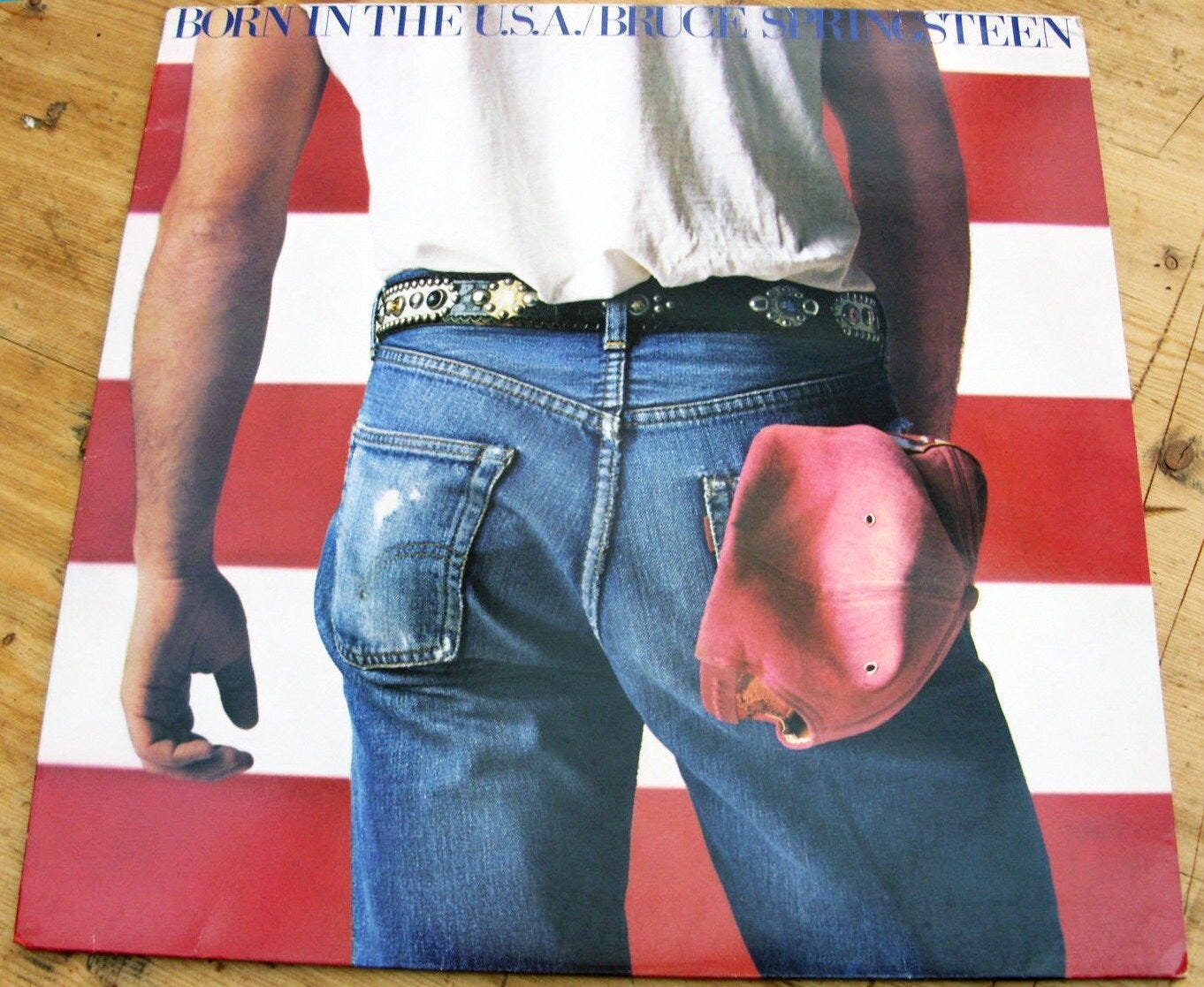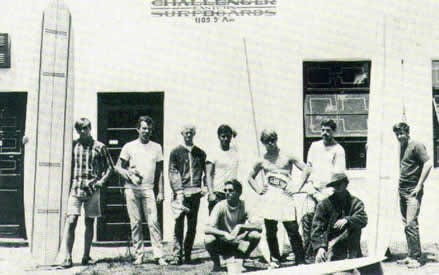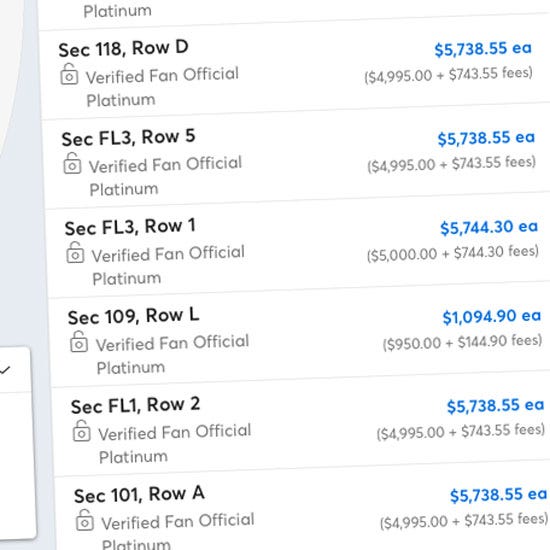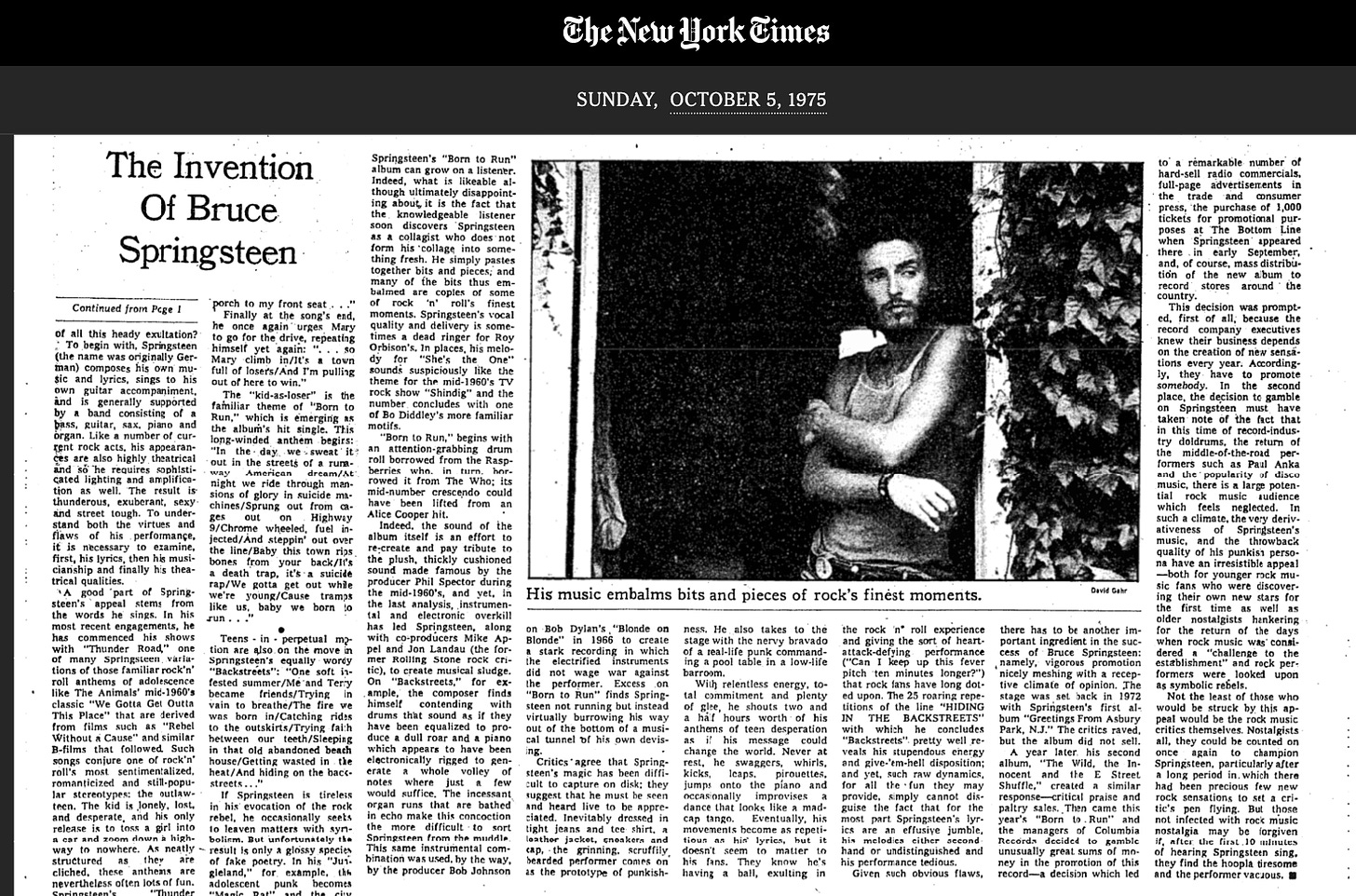
Discover more from American Ambition
I’ve spent the last month listening to a lot of Bruce Springsteen albums trying to answer the question - is Bruce Springsteen a phony?
Or is he the real deal?
Could the guy who’s written ‘Born to Run’; who followed up a mega-platinum album with a heartbreakingly beautiful dirge record called Nebraska; whose songs you scream by heart - is he actually a phony?
Or is the guy who lives on a horse ranch; whose equestrian daughter is an Olympic medalist in that snobbiest of all sports; who nonetheless postures as an authentic voice of the working class - could he really be the real deal?
Is the guy who won’t stop working for his loyal audiences; who puts on concerts longer even than my favorite band, the Grateful Dead; who brings energy, exuberance, ecstasy to every show; who has always been rock & roll future - is he, despite all that, a phony?
Or can the guy who charges $850 to his show on Broadway; who reinvented sticker shock with $5,700 tickets to his sold-out 2023 tour; who makes millions off his songs about factory towns and dead-end jobs - could that guy possibly be the real deal?
Could the guy who screams “Born in the USA” behind thunderous drums and arena rock synthesizers; whose best-selling album cover is an American flag motif - is he secretly a phony?
Or is the guy who wrote the cynical lyrics to “Born in the USA” and then scored it for hitting the Top 40 charts; who sings, bafflingly, about throwing “speedballs”; and who stuffs his baseball hat into his back pocket because he’s never been a normal American at all - is he actually the real deal?

It’s been this way for Bruce Springsteen his entire career - the questions about truth and trust, fake and phony, hero or humbug.
And while he’s attracted millions of fans, he’s also produced legions of haters…
“Nobody tries harder, and less persuasively, to be everyman than Bruce Springsteen,” says the New Republic. “The sanctimony, the grandiosity, the utterly formulaic monumentality; the witlessness; the tiresome recycling of those anthemic figures, each time more preposterously distended; the disappearance of intimacy and the rejection of softness.”
Twisted Sister’s guitarist writes “Immediately, and I mean immediately, I thought his writing was a plain Dylan rip off of rhyme and style. Maybe to someone it was clever but not to me. I actually was offended by it and thought that Dylan would just either laugh or sue this guy.”
Probably more than any other rock star in the pantheon, the question asked about Bruce Springsteen is always, ‘is this guy the real deal or a stone-cold phony?’
Let’s take a poll and get your opinion first before we dive in.
The answer is obvious to me.
From the past month of my listening to Bruce on repeat, repeat, and repeat on my Spotify, it’s crystal clear.
The music is beyond-belief great.
I’ve been working on this email and cycling through his albums all July. The depth of musicianship in even the far reaches of his back catalog is profound. I’ve found myself hitting “repeat this song only, over and over” on Spotify for tunes such as “Brilliant Disguise,” “Highway Patrolman,” “4th of July, Asbury Park,” “Thunder Road,” and “I’m On Fire.” Should you venture into it, I’ll bet you’ll find your own five favorite songs that’ll go on repeat.
He is a maestro. How he makes a chorus click into place with a simple observation or a line that takes dead aim (I don’t think there’s a better American lyric about brothers than “nothing feels better than blood on blood”). He has an unbelievable connoisseur’s ear for musical arrangement. And he has a voice that can be squeezed into every shape of human emotion from pitiful sadness to raucous joy to naughty escapism to painful love.
Yeah, he’s the Boss.
So if I had just stopped this newsletter after listening to the music, the case was closed: Bruce Springsteen is the real deal.
But then last week this $5,700 ticket price kerfluffle broke, and I decided I owed it to you all to at least watch the Netflix show, “Springsteen on Broadway,” the filmed version of his record-breaking Broadway show that promised soul-bearing insights from the man.
First the praise.
When it comes to his music, he can, remarkably — almost impossibly — still turn the trick as a 70-year-old man. The gravel-husk voice that yelled in arenas is strangely, surprisingly, just as compelling in a whispered theater.
And he looks great. He’s spent his excessive good fortune on youthful looks. His vanity pays off - he is still the rock star from central casting.
When he does an off-tempo, new-key rendition of “Thunder Road”, every word and every string are telling you a song that you’ve heard for five decades, but it feels as though you never really listened to it before, did you? It’s beguiling magic.
Springsteen is clever, funny, and convincing when he tells us that he hated school. It’s the one absolute prerequisite to be an authentic rock-and-roller, he deadpans.
And in fact, he is a great comedy writer and has good comedic delivery. Six decades of stagecraft make him comfortable and charming in his self-deprecating set-ups.
But the show is awful.
It takes everything great about rock and roll and surrounds it, swallows it, smothers it, with an insufferable sanctimony, hokey prose and an old hero playing a role he’s fooling himself into thinking we believe.
Which is why I feel sorry for Bruce Springsteen, the man, and who he reveals himself to be.
Now lots of rock and roll songs talk about the loneliness of the road, and of the career, and ‘Springsteen on Broadway’ paints a poignant picture of that truth.
Here’s an old man, who is beyond needing your money, applause or respect. He’s created a body of work that will stand the test of ages.
And yet he is so lonely and empty at his core that he feels he must write a one-man show about himself and lie. To live the life that he’s lived and to put on this cheap, tawdry show is embarrassing.
Let’s take a few of the most obvious examples from ‘Springsteen on Broadway’:
A superb songwriter, he is an awful poet. He’s too obvious, he reaches for the mystical too mawkishly, he too transparently wants you to feel in awe of Bruce Springsteen’s command of the godly around us.
A story about Elvis’ guitar starts off convincingly until he transforms it into a “staff of righteousness.” He is far too great of a lyricist to ever allow a self-important phrase like that into one of his songs, yet he packs his show with these overblown pronouncements that make him seem ridiculous and small.
His spoken-word stories ring false. As an altar boy, I served at many, many Catholic weddings - where the custom used to be to throw rice at the newlyweds on the church steps. There’s simply no way he and his sister gathered up the tossed rice afterwards to save for the next weekend’s weddings.
At the end of the workday, his mother’s office building isn’t just emptying out. No, it’s that “the building was so still after all the noise of the day — it got so quiet — it was as if the building itself was resting after a long day of service in the interests of our town.”
Even the plaster is socially conscious in Bruce Springsteen’s holy world!
He reads these lines of pious humbug clumsily from his teleprompter - itself an eyebrow-raising innovation on Broadway - and fails to convince us that he believes any of it.
His story about his dad can’t be true, and he’s blinking like a Clinton throughout the tale, as liars do.
And the final, hokey, big tree monologue at the end reminds me of the Oscar Wilde quote that 'One must have a heart of stone to read the death of little Nell without laughing.'
He accompanies all of this with a cheap type of false modesty, allegedly poking fun at his own fraud - that he sings songs about factories even though he’s never set foot in one - and that he’s never worked five days in a row until Broadway, and he doesn’t like it. But all this is only to show us what a true small town rascal he really is.

He lavishes praise on himself and his ability to fool us right before our very eyes, declaiming, “that’s how good I am.”
What Springsteen the musician is able to tear out of your heart with a seemingly stray detail in a sad song, Springsteen the staged memoir is impossibly unable to beat out of you with a mountain of half-cocked adjectives and profound exclamations in his prose.
So why does Bruce do it? Why is he so uncomfortable in his own skin that he needs to hawk this fake Bruce to people who are too rich and too out-of-touch to realize they’re being swindled?
He loves being a rock star. Absolutely loves the power of it, the fame, the free time spent with presidents and royals and Olympic equestrians. The wealth, the deference, the idolization he craves would fulfill even the hungriest of narcissistic hearts.
He loves it, but he can’t allow himself to admit that to himself or to us.
Instead he wants to be loved for his spirituality, his godliness. His ambition is to be idolized for his virtue. To be praised for his absence of pride. To be showered with money and attention and gifts for his selflesssness.
It’s the self-promoting humility more often found in televangelists than dirty rock-rollers, but what Bruce wants to be in your pantheon is a saint — motives always pure, actions always selfless, soul always free of desire for gain on this Earth.
And thus the world he tries to sell us is fake.
Here is a man of compelling ambition, with a perfectionist musical vision, who has had to disappoint many of the less-talented in his entourage over the years as he clawed his way to the top of the charts in a ruthless, vicious industry.
We admire American ambition at American Ambition, and there’s a far more interesting story for Bruce to tell us if he’d only been honest with himself and told it like it was:
“I wanted to be famous and rich and I was unbelievably ambitious. And ruthless. And in seeking stardom, I was willing to do anything possible to make it happen. Anything.”
There would be the stories of ditching his original band Steel Mill, and ditching his original manager when someone more famous and connected came along. The tales of insanely long hours in the studio to get it just right - six months on the song ‘Born to Run’ alone.
Of discovering his gift with the torrent of lyrics just pouring and pouring out of him, and learning how to struggle with and eventually command that precious talent, against jealousy, against fools, against indifference.
With a talent like Bruce’s, he was always going to have to leave the boondocks behind, and let some people down along the way. The perfectionism and the single-mindedness and the panting, grasping search for fame - they’d make a great story.
But the reason he doesn’t tell us that story is because it would hurt his image of himself. It would damage who he wants to be in our eyes.
You love him for his music, his singing, his showmanship.
But what he wants to be loved for his spirituality, his saintliness. Thus every story he shares must be awe-inspiring, mystical, mythical, and false, phony or plagiarized. This show, this shtick, this whole staged persona is a cheap trick where tries to peddle us an aw-shucks version of the birth of the superstar.
It’s one in which he never had any hard choices to make. Where he never had to let anybody down, or prioritize his success over that of others. A world in which his ambition and his loyalties never came into conflict. Where his feelings as a sensitive artist and the grinding music business never clashed.
In Bruce’s telling, he was ambitious merely to help out widows and veterans and poor kids. He sang only because the trees and the buildings and the rug mills of Freehold sang to him.
He wants us to know that this demi-billionaire musical genius is really a regular guy who’s just doing everything he’s doing in the interests of somebody else.
Believe it if you dare.
Or maybe I’ve got it totally wrong and this warmed-over savior-from-the-Shore story is exactly what the customer wants. And Bruce is the smart-enough showman who knows how to give the audience what it fancies.
We pay these outrageous prices to be seated in the hands of brother Bruce for a few hours and hear fantastic stories about sin, guilt, and redemption. We praise the songs about the working class and factory towns from our $850 seats because that’s easier than, you know, actually doing something about factory towns and the working class. Certainly none of his audience plans on leaving the Broadway show to go to a shot-and-a-beer dive bar afterwards and chat up the high school drop-outs from the day-shift firsthand.
Maybe whatever fantasy of salvation and spirituality Bruce is selling is exactly what we demand, and the price he pays for climbing into the costume every night is the price that all performers pay when they tell tall tales for our amusement.
And if it’s us that call forth this made-up Bruce for our own watching pleasure, who forces the musician with his generational talent to play a part even when he’s not singing the songs, then maybe the question we should be asking isn’t about Bruce Springsteen, but about us, and about our need to find meaning, not in real life, but in the staged performance of the life of a charming and talented musician.
Maybe the question we should really be asking is…
Are we phony, or are we the real deal?
Subscribe to American Ambition
“An informed patriotism is what we want. Are we doing a good enough job teaching our children what America is and what she represents in the long history of the world? She is a shining city upon a hill.” - Ronald Reagan ~Largest Substack on the Right~







Reading this makes me realize why I love Tom Petty so much. He fought to keep ticket prices reasonable, cooperated on a biography that often makes him look like a complete asshole, and was the real deal. Also in Peter Bogdanovich's documentary, talked openly about having to ditch a band member and other things that made him look less than saintly. If you want a "rock star," look to Bruce. If you want real rock and roll, I recommend Tom.
Been a fan for 42 years. I think Bruce is a brilliant singer, songwriter and showman. The best concert I ever saw was the 1984 Born in the USA tour. That said, he is obviously a complete phony. His lyrics speak to the working man and people who struggle through life. Yet he clearly doesn’t give a crap about the working man. Unfortunately, I’ve been hoodwinked. As my dad told me years ago…”that Springst$$n guy you like is a bullshit artist”. Once again my dad was right.